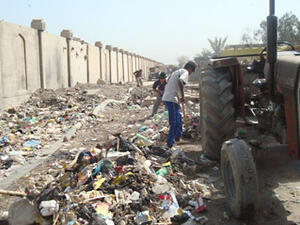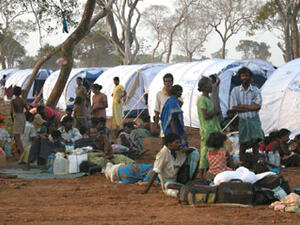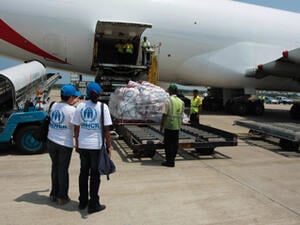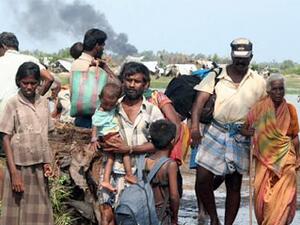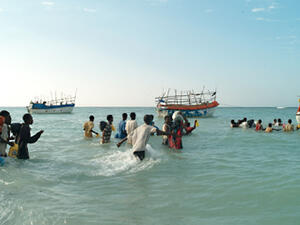Land allocation scheme yields first results in Afghanistan
Land allocation scheme yields first results in Afghanistan
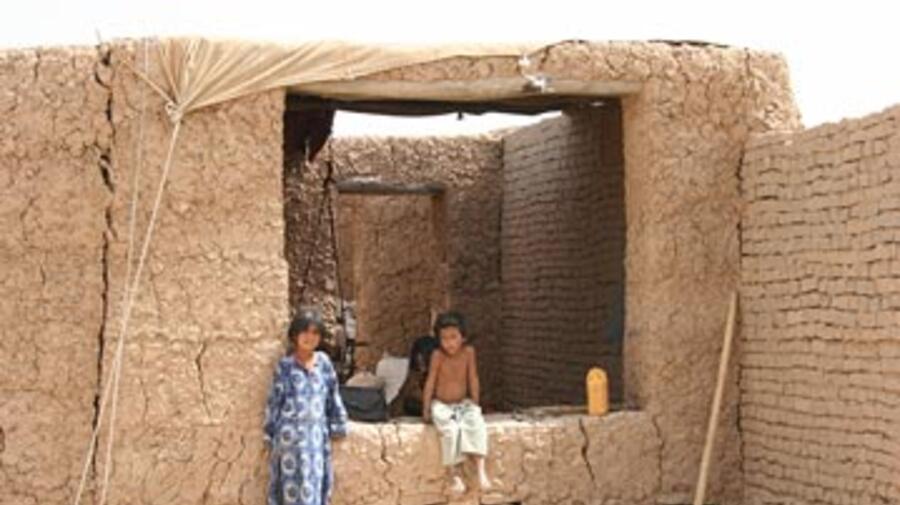
Young returnees from Iran help their parents to build their house on government land in Ettehad township, Baghlan province.
PUL-I-KHUMRI, Afghanistan, September 14 (UNHCR) - A government land-allocation scheme in Afghanistan has distributed property to thousands of landless Afghans who have repatriated to northern and eastern Afghanistan.
The programme is a welcome development in a country plagued by multiple land claims. According to a 2005 census of Afghans in Pakistan, 57 percent of those who did not want to return cited lack of shelter as the main reason, while only 18 percent cited livelihood and security as obstacles to repatriation.
"It is not easy - especially in a post-conflict country - to distribute land for landless people, in particular to returnees who have long been away from their country," said Ustad Akbar, Afghanistan's Minister for Refugees and Repatriation (MoRR). "The selection of land has been a challenge and I am glad to say that now we have launched townships in 29 provinces."
The land allocation scheme, which was formalised by presidential decree last December, states that to qualify a returnee or internally displaced person (IDP) must possess a national identify card from their province of origin as well as documents to confirm their return to Afghanistan or internal displacement.
The applicant cannot own land or a house in their name or that of a spouse or child, while priority is given to families headed by women and to returnees who are disabled or widowed.
Selection is done by inter-ministry commissions in Kabul and the provinces, which also set the price of the land. So far, more than 300,000 plots of government land have been identified in 29 provinces. Some 18,000 plots have been distributed. But progress in some areas has been impeded by land claims by private landowners or a lack of coordination among government ministries.
One of the areas that have made significant progress is Ettehad township in northern Baghlan province. Already, 3,000 plots of land, each measuring 600 square metres, have been allocated and 2,700 families are building their houses.
With funding from the United States, a French aid agency is helping to build 1,000 houses while UNHCR has provided 50 shelter packages for the most vulnerable families. More than 40 wells are planned. Some 500 families have moved in, and another 1,000 plots will be distributed soon.
"We didn't wait for the government money to come before starting work," said Imamuddin Khan, head of Baghlan's department of refugees and repatriation (DoRR). "We used what we had in our own budget and the returnees themselves did the work." He explained that every block of 1,000 plots will have two schools, two clinics, four mosques, as well as markets and government offices.
Naeem returned to Baghlan from Iran last year and was given land in Ettehad after a selection process based on a quota of 80 percent for returnees, 15 percent for IDPs and five percent for the handicapped. He spent five months building his house with his wife and four children.
"We worked together on this house," said his wife. "Of course I'm happy now. In the past, we were living in rented houses, and in foreign countries. The landlords used to beat up my children. Now at least we have our own home."
Naeem added, "I'm now doing construction work for the neighbours. I'm confident I can continue this work because there is a demand."
While proud of the progress so far, DoRR's Khan said, "There should be a real difference between a shelter project and a housing project. At the moment, there is still no safe drinking water, no schools, no clinics, and few jobs ... we also need income-generating activities like metal works, carpentry, construction."
Over in eastern Afghanistan's Nangarhar province, Sheikh Mesri township has similar needs. Some 3,000 plots of land have been allocated and over 600 families have moved in. The International Medical Corps has a mobile clinic there while UNHCR is providing tents for a school and 50 shelter units for vulnerable families. The refugee agency is also funding six wells for general use.
A private company has just finished building a water reservoir and pipe system that will facilitate water distribution and conservation. But township dwellers feel it is not enough. "There is nothing here," said Aslamuddin, a Nangarhar native who returned in August. "There are no proper roads to the city. Sometimes small taxis pass but the prices have doubled because of rising oil prices."
Jacques Mouchet, UNHCR's representative in Afghanistan, put the challenges in context: "Issues like land, water and livelihood are problems not just for returnees, but for the large majority of Afghans. Only long-term national development can solve these problems."
Sheikh Mesri and Ettehad are among five townships in Nangarhar, Baghlan, Ghazni, Logar and Herat provinces that have been singled out for completion under the pilot land allocation scheme. A joint working group, including government agencies and UNHCR, has appealed for US$25 million to develop these five returnee townships.
The success of the scheme will set a good example for other provinces and encourage donors to consider bilateral funding for the nationwide scheme.
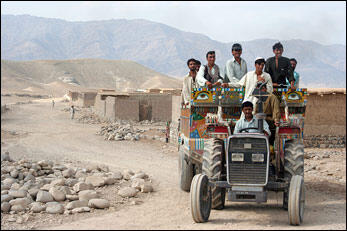
Building Sheikh Mesri township in Nangarhar province.
"The land allocation scheme certainly helps and encourages those Afghans who have shelter problems to return to their country. I believe the repatriation of Afghans has direct links to developments in Afghanistan. The more developmental projects we launch, such as the housing project, the more we facilitate the repatriation of Afghans," MoRR's Ustad Akbar said.
Some 3.7 million Afghans have repatriated with UNHCR help since 2002, mostly from Pakistan and Iran. Another 1 million have returned by their own means.
By Vivian Tan in Pul-i-Khumri, Afghanistan



